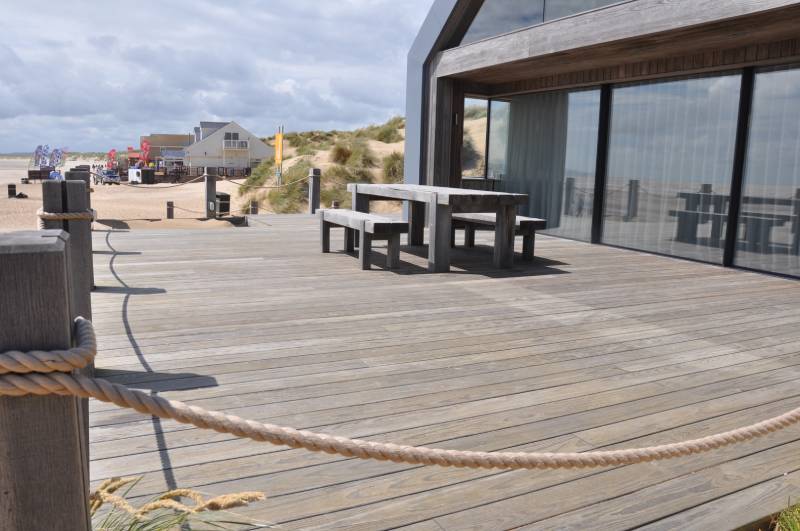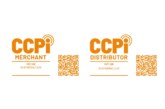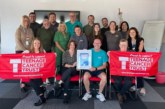
David Hopkins, Managing Director of the Timber Trade Federation, discusses the opportunities for merchants in relation to modified woods.
It’s not often that the Executive Chairman of Walt Disney can be seen to offer a nugget of wisdom to the timber industry. Yet Bob Iger’s quote that “You can’t allow tradition to get in the way of innovation. There’s a need to respect the past, but it’s a mistake to revere your past” seems particularly apposite.
So whilst timber has a long and glorious past as a respectable, traditional material, it is also a material of the future.
Wood locks away CO2 in its fibre for its lifetime and extending timber’s natural lifespan is the reason for rising interest modified woods: timbers undergoing non-toxic modification to make them more durable.
Softwood timbers modified by impregnation and other processes include Kebony, Lignia and Accoya. Others such as ThermoWood are modified using only heat-based techniques. All offer merchants an opportunity for added-value business with specifiers and local architects.
Accoya, for example, is already valued by the joinery sector for its durability and dimensional stability in manufacturing windows and doors. Starting with northern European certified softwood, acetic anhydride is used in a patented acetylation process. This reduces its ability to absorb water, making it more stable, and decreases its attraction to fungi and rot. Accoya carries a 50-year warranty used above ground and 25 years in ground or freshwater. It is also available as decking and cladding.
LIGNIA wood, meanwhile, is manufactured in Wales. A ‘small movement’ timber, a process of resin impregnation and heat modification is used to improve dimensional stability. LIGNIA also offers a 50-year warranty when used above ground, whilst it is said to be harder than Teak and can be used internally and externally as cladding, furniture, flooring and decking:
“It’s an exceptionally versatile material,” says LIGNIA’s Commercial Director Steve Rogers. “For merchants with a kitchen showroom, LIGNIA can be used for both kitchen flooring and for external decking, giving a consistent look to both indoor and outdoor spaces,” he adds. “It is non-corrosive to standard steel fixings and can even tolerate a salty seaside environment.”
LIGNIA machines similarly to a medium density hardwood, and can be laminated for window and door manufacture. “We can supply samples to builders’ merchants so that they are aware of the product should they receive enquiries,” continues Steve. “Following the Surface Design Show in February we have been inundated with architects requesting information. Merchants should be aware of LIGNIA so they can tap into the business potential.”
Kebony utilises a by-product of the sugar cane industry — furfuryl alcohol — to impregnate the softwood cell walls, locking in natural polymers to form a stable, durable structure. The wood is then heated and cured, permanently thickening the cell walls by around 50% to produce material with a 30 year warranty if used above ground. It is a process that gives Kebony a durability akin to some tropical hardwoods.
“There are two grades of Kebony: Clear and Character grade,” reveals Tom Ford, Assistant General Manager at Brooks Bros Danbury — the sole distributors of Kebony in the UK. “With the Clear grade, made from Radiata Pine, the ‘Kebonization’ process reaches right to the centre of the boards. This means it can be profiled, cut and carved in the same way as any normal timber.
“The Character grade is more knotty, made from Scots Pine, and is slightly rougher to the touch. The process doesn’t quite reach the centre so these boards are profiled in Norway before treatment.”
As the furfuryl alcohol comes originally from sugar cane, when given the charred look now so popular with architects, Kebony takes on a honeycomb surface appearance which will not rub off when coated with oil. “We’ve found this to be popular for feature walls in Japanese restaurants, as well as for external cladding,” Brooks’ Tom Ford adds.
Brooks Bros provides samples and often connect merchants into the supply chain where Kebony has been specified for a local project.
Originating in Finland, heat and steam treatment is the basis of ThermoWood, supplied by Metsä Wood. Pine and Spruce are heated to in excess of 200° Centigrade, changing the cell structure and removing resin from the wood. This reduces ThermoWood’s ability to gain or lose water, enhancing dimensional stability and producing a service life of 30 years without the need for preservatives.
All these modified woods live up to the Timber Trade Federation’s pledge to provide ‘Timber You can Trust’. Each utilises sustainably-sourced, certified material and all offer merchants an opportunity for business innovation, combining the solidity of timber’s past with techniques of the 21st century.









